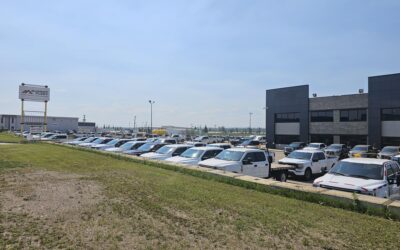Biggest Concerns for Fleet Managers in 2021
Wondering what the top fleet concerns of 2021 are? You’ve come to the right place!
Without a doubt, 2020 was the most overwhelming and challenging year in the history of fleet management. As the industry looks toward a new beginning in 2021, it does not expect any remarkable changes in the modus operandi. In March 2020, when the COVID-19 pandemic had its initial impact on the fleet industry, the conventional wisdom was that the US would beat the virus by the year’s end. The consensus was that as 2021 rolls in, the industry would go back to normal.
However, even with the advent of the COVID-19 vaccine, things are still far from going back to how they were. The slow distribution of the vaccine at the state level has compelled people to refer to 2021 as a transitional year. The industry believes that it’s going to be a year of slow and gradual recovery.
Given the state of affairs, Automotive Fleet explored the realities of the fleet industry and the top fleet concerns in 2021. To do so, they reached out to numerous fleet managers and suppliers to learn what they are anticipating from the new year.
Let’s take a look at the most pertinent concerns for the fleet industry for this year.
Top Fleet Concerns in 2021
Chassis Availability and Long Lead Times for Product Deliveries
The primary concern among fleet managers was of a tactical nature. It pertains to the unavailability of fleet chassis and the long lead times for product delivery. This concern is primarily due to the tight constraints of the cargo van area and the colossal inventory, fueled by the growth in e-commerce and last-mile delivery.
As we slowly exit the peak season of e-commerce, the industry expects the last-mile delivery segment to return to its yearly 10% growth. However, this still means that fleet managers will encounter some limitations in the form of longer lead times with cargo vans. The main reason is the continued growth of last-mile delivery services.
The Rise in Acquisition Costs and Capitalized Costs
Another area of concern for the fleet industry is the lack of sedans in the market, which is narrowing their options. There’s general agreement that the demand for SUVs, trucks, and crossovers will continue to grow, which is great for resale value, but not so great for fleets looking to acquire new vehicles. This is because the acquisition costs continue to trend upwards.
Additionally, the capitalized costs on fleet vehicles are also rising due to the use of inventive technology in them. Safety technology, Advanced Driver Assistance Systems (ADAS), in particular, is leading to an increase in vehicle operating and maintenance costs. Today, the simple act of replacing a windshield requires you to recalibrate your ADAS, which is an added expense that didn’t exist before. It has also led to an increase in accident management costs.
Boosted Resale Value of Used Fleet Vehicles
There has been a massive decline in new vehicle sales, particularly in the rental car industry. If you envision today’s new vehicles as tomorrow’s old ones, you must already know that this decline will affect the resale value of these vehicles. This is because fewer vehicles will end up in the used vehicle markets in the future, which will put upward pressure on their resale value. That is certainly a positive impact for the commercial fleet industry as it can generate profits from reselling its old vehicles.
Introduction of New Commercial EVs
Another top fleet concern among fleet managers and suppliers is the industry’s move toward sustainability and its interest in the forthcoming EV products. This interest is more pronounced at the governmental level as more and more states continue to issue road maps for carbon output reductions. This is particularly true for California, where EVs are an integral part of the state’s plan to diminish its carbon output and achieve its sustainability goals.
Moreover, commercial vehicle EVs are also being introduced in the market. They have yet to flood the market place in volume, which is why many fleet managers are still using hybrids as a short-term solution to achieve sustainability. However, eventually, EVs will take over the hybrid and conventional vehicles in various vehicle segments, including the fleet industry.
Impact of Budget Constraints on Major Fleet Safety Initiatives
Fleet safety continues to be a top concern for fleet managers as it is continually impacted by budgetary constraints. Even though the senior management is in favor of fleet safety, managers are often unable to convince them to make significant outlays for fleet safety. It continues to affect major safety initiatives and the implementation of telematic solutions. Moreover, behind the wheel training has also decreased due to the pandemic. However, fleet companies are offering online safety courses to employees who are working from home.
The After-Effects of the Work-From-Home Business Model
The strategic segment of the fleet industry also gives rise to a major concern. The entire work-from-home phenomenon has been surprisingly fruitful for the industry as it gave employees the flexibility that they needed to remain productive while managing their affairs. However, now that we are in the recovery stage, the industry is unsure about how to deal with its impact in the future.
Will there be a permanent change in how fleets operate from now onward? If the work-from-home situation becomes semi-permanent, it will surely affect face-to-face sales and in-person meetings. It will certainly lead to greater pressure on the sales department. It will also have an impact on fleet utilization and the number of vehicles that a company uses in its fleet.
It’s still something that is up in the air. However, a significant number of companies have surely embraced the work-from-home model, which might lead them to make permanent changes in their operations.
The Bottom Line
The fleet industry is coming out of a troublesome year, which naturally brought on some top fleet concerns. The best way to move forward is to tackle these concerns in a systematic and goal-oriented manner. Fleet managers need to consider where their company stands in 2021 and work toward handling any challenges that they might face in the new year.
Source:
https://www.automotive-fleet.com/10133850/state-of-the-fleet-industry-top-fleet-manager-concerns-for-2021






